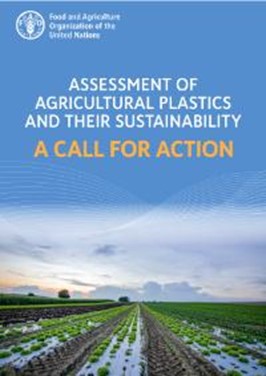Assessment of agricultural plastics and their sustainability. A call for action.

The use of plastic products in today’s agriculture is becoming increasingly commonplace all around the world. The variety of plastic polymers, their ease of manufacture, physical properties and affordability make them the material of choice for many applications in agriculture, all providing a range of benefits. However, despite the many benefits, agricultural plastics also pose a serious risk of pollution and harm to human and ecosystem health when they are damaged, degraded or discarded in the environment.
The curious case of vanishing plastics and the harmful consequences
Data show that only small fractions of agricultural plastics are collected and recycled, predominately in developed economies. There is evidence that elsewhere most plastics are burned, buried, or landfilled, although record keeping is generally non-existent. The accumulation in soils of residues of mulching film has been shown to reduce agricultural yields. Of emerging concern are microplastics derived from agricultural plastic products, which have potential to transfer along trophic levels, with the possibility of adversely affecting human health. Larger plastic residues in both aquatic and terrestrial environments have the potential to harm wildlife through entanglement and ingestion. Some plastic resins contain toxic additives that have known endocrine disrupting properties. Furthermore, the evidence is increasing that plastic fragments and microplastics are vectors for the long-range dispersal of pathogens and toxic chemicals in oceans. In addition, inappropriate disposal of agricultural plastic at dumpsites prone to fires, or open burning on farms, are sources of toxic emissions.
Urgency for coordinated and decisive action
The report identifies alternatives and interventions to improve the circularity and sound management of agricultural plastics based on the 6R model (Refuse, Redesign, Reduce, Reuse, Recycle, and Recover). Based on a review of the existing global legal, policy and management frameworks, the study concludes that there is no overarching international policy or legislative instrument that addresses all aspects of the use of plastics in agrifood value chains and throughout their lifecycle.
Apart from identifying existing knowledge gaps and suggested areas for further research, this study also recommends mainstreaming the sustainability of agricultural plastics throughout FAO’s instruments and guidance related to good agricultural practice, food security, food safety and nutrition.
The complete study “Assessment of agricultural plastics and their sustainability. A call for action.” can be downloaded here.
EmConSoil coordinator
- Adres
- Stationsstraat 110
2800 Mechelen
Route en bereikbaarheid - Telefoon
- +32 15 284 284
